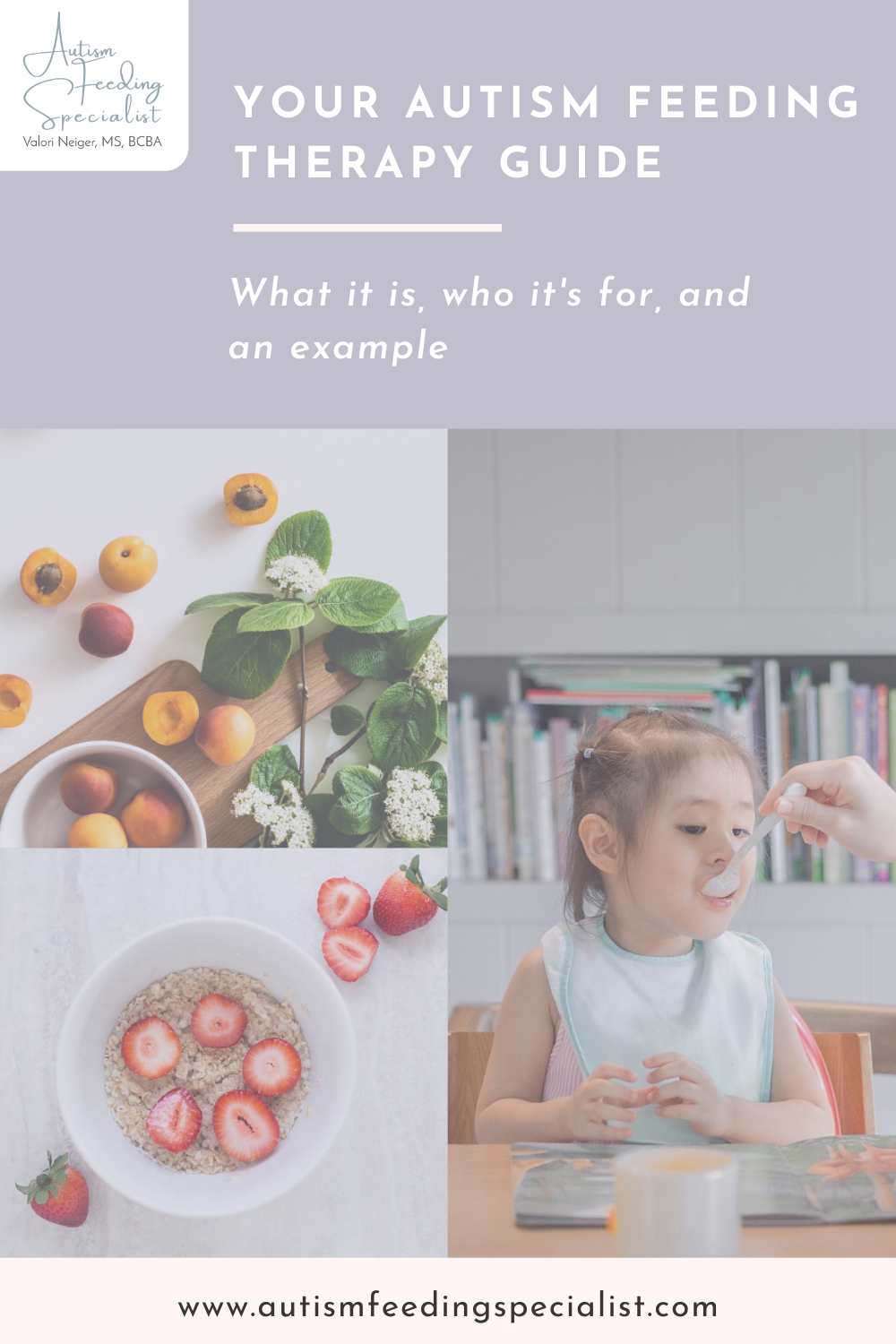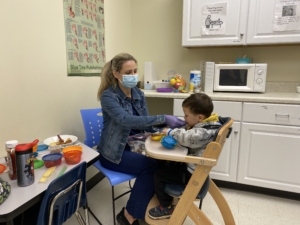Leading Your Youngster Towards Success with Feeding Therapy Long Island
Wiki Article
Navigating the Path to Effective Feeding: Ingenious Methods and Interventions for Reliable Feeding Therapy
Are you struggling to locate efficient strategies and interventions for effective feeding therapy? And also, we'll show you the relevance of collaborating with families and caregivers for ideal feeding end results. Get prepared to navigate the path to successful feeding!Assessing Feeding Obstacles and Identifying Goals
You ought to begin by examining your child's feeding difficulties and identifying specific objectives for their therapy. It's important to interact these goals with your kid's feeding therapist so they can tailor the therapy sessions to deal with these specific obstacles. By analyzing your youngster's feeding obstacles and establishing objectives, you are taking the initial action towards aiding them develop effective feeding skills.Implementing Evidence-Based Approaches for Feeding Therapy
Carrying out evidence-based techniques for feeding treatment can result in positive results for kids. When you incorporate these approaches into your youngster's therapy plan, you are making certain that the interventions utilized are supported by scientific study and have been verified effective. This strategy increases the likelihood of success and assists attend to the certain feeding obstacles your kid might be experiencing.By complying with evidence-based approaches, you can offer your kid with the ideal feasible treatment and support. These techniques may consist of making use of a selection of sensory experiences throughout nourishments, such as discovering different appearances and flavors, to urge acceptance of new foods. In addition, carrying out therapy methods can help attend to particular eating habits and advertise healthier eating patterns.
An additional essential element of evidence-based feeding treatment is involving the household in the therapy process. By providing education and learning and assistance to parents and caretakers, they can play an energetic duty in helping their child get over feeding obstacles. This joint technique improves the effectiveness of treatment and advertises long-term favorable changes in your child's consuming routines.

Resolving Sensory Processing Issues in Feeding Treatment
Resolving sensory handling issues in feeding therapy can be challenging, but it is essential for advertising a positive consuming experience for youngsters. When you experience a youngster with sensory processing difficulties during mealtime, it is vital to comprehend that their reactions to specific structures, preferences, scents, and even noises are not deliberate (food therapist long island). By acknowledging and dealing with these issues, you can aid develop a helpful atmosphere that motivates healthy eating practices
This technique allows the youngster to end up being familiar with the food and its sensory residential or commercial properties at their very own speed. In addition, using a variety of appearances and flavors can help desensitize their sensory system and increase their food preferences.
Involving the child in sensory play tasks can additionally be beneficial. Urge them to explore various structures, such as squishing, squeezing, or touching different food items. This can assist normalize sensory input and reduce aversions to certain structures.
Another vital element is giving a structured and tranquil eating atmosphere. Minimize interruptions, such as loud noises or bright lights, which can bewilder their senses and prevent their capacity to concentrate on consuming. Producing a foreseeable routine and he has a good point making use of visual timetables can additionally help the child feel more safe and in control throughout nourishment.

Using Assistive Modern Technology and Adaptive Devices
Using assistive innovation and adaptive equipment can greatly enhance the feeding experience for youngsters with sensory handling troubles. Nourishment can be frustrating and tough when you have difficulty with sensory processing. Yet with the right devices, you can make it a much more effective and satisfying experience.One alternative is utilizing specialized utensils and plates designed to fit your requirements. These utensils might have textured takes care of or a bigger grip, making them easier to adjust and hold. Plates with separated sections can help divide various foods and prevent them from touching, which can be a resource of pain for some kids.
Along with specialized utensils and plates, there are also assistive devices that can be used during feeding. A heavy vest or lap pad can supply deep stress input, aiding to calm and regulate your sensory system. A shaking toothbrush or chewable fashion jewelry can read supply oral sensory stimulation, making the act of consuming extra enjoyable.
Modern technology can additionally contribute in enhancing the feeding experience. There are applications and devices readily available that can supply aesthetic or auditory signs, such as timers or triggers, to aid you remain concentrated and organized throughout nourishment.
Teaming Up With Households and Caretakers for Effective Feeding Outcomes
When collaborating with families and caregivers, you can function together to create a caring and encouraging environment for effective feeding outcomes. By including families and caretakers in the feeding therapy procedure, you can gain useful insights into the child's feeding practices, obstacles, and preferences. feeding therapy farmingdale ny. This cooperation permits an alternative strategy to feeding treatment, dealing with not only the physical elements but additionally the psychological and emotional elements that may influence a child's feeding abilitiesOne key element of working together with caregivers and family members is providing education and training. By outfitting them with expertise and skills, they can actively join the feeding therapy procedure and sustain the child's progress beyond treatment sessions. This can consist of educating them feeding techniques, techniques for managing nourishment behaviors, and comprehending the significance of consistency and regimen in developing healthy and balanced consuming habits.
Furthermore, involving family members and caretakers in objective setting and treatment planning makes certain that their perspectives and goals for the child are taken into account. By working together, you can develop realistic and attainable objectives that align with the household's worths and concerns - food therapist advice farmingdale. This collective approach cultivates a feeling of ownership and empowerment, creating a strong structure for effective feeding results
Additionally, open and normal communication with caregivers and family members is essential for efficient cooperation. By preserving ongoing discussion, you can attend to issues, provide assistance, and make required modifications to the feeding treatment strategy as required. This communication also enables sharing development updates, celebrating accomplishments, and identifying any difficulties or obstacles that might emerge.

Verdict
Congratulations on finishing this post on navigating the path to successful feeding! You have discovered different techniques and interventions for reliable feeding therapy, such as analyzing obstacles, carrying out evidence-based methods, attending to sensory handling problems, and utilizing assistive innovation. By working together with families and caretakers, you can make certain effective feeding results. Keep in mind to always stay aggressive and ingenious in your technique to feeding treatment. Maintain the magnum opus!It's important to communicate these objectives with your kid's feeding specialist so they can tailor the therapy sessions to resolve these details difficulties.Applying evidence-based strategies for feeding therapy can lead to favorable end results for kids.Addressing sensory handling concerns in feeding treatment can be difficult, but it is crucial for promoting a positive eating experience for kids. By including family members and caregivers in the feeding therapy procedure, you can gain useful understandings right into the kid's feeding choices, obstacles, and routines. By furnishing them with understanding and skills, they can actively participate in the feeding therapy process and support the kid's development outside of therapy sessions.
Report this wiki page